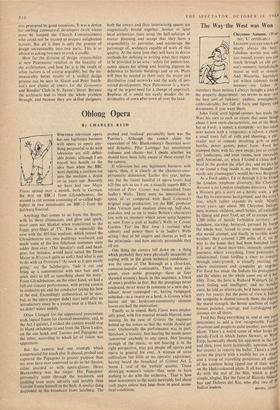Oblong Opera
By CHARLES REID Anything that comes to us from the theatre, with its three dimensions and glow and spark, must seem wet blanket when transferred to the foggy grey-blues of TV. This is especially the case with the 405-line medium, which turned the Glyndebourne sets into puddingy woolwork and made some of the less felicitous costumes seem odder than ever. (The Speaker's staff and head- gear, for instance, would have suited the Drum Major in Wozzeck quite as well.) And what is one to do with an Overture? 'As soon as it gets nicely going,' say the Salzburgers, 'fade it out and bring up a commentator with nice hair and a snick shirt to tell us something about the story.' From Glyndebourne, on the other hand, we had a full-out concert performance, with prying camera in orchestra-pit and the conductor taking his bow at the end. Exceedingly untheatrical, to be sure; but, as the opera proper didn't start until after an introductory essay by a young man in a black tie, we didn't wince unduly.
Often I longed for the suppressed proscenium arch, logical frame for classical ensembles; and, in the Act 1 quintet, I wished the camera would stop its bland switchings to and from the Three Ladies, on the one hand, and Tamino and Papageno on the other, according to which lot of voices was - uppermost.
But the camera had one triumph which compensated for much else. It chased, probed and captured the Papageno to greater purpose than my eyes have ever contrived to do in the theatre, either unaided or with opera-glasses. Heinz Blankenburg was the singer. His Papageno- .personality came through the woolwork and pudding even more adroitly and lovably than Geraint Evans himself in the flesh. A similar thing happened in the broadcast from Salzburg. The
probed and 'realised' personality here was the Pamina's. Although she cannot claim the equivalent of Mr. Blankenburg's theatrical nous and dynamic, Pilar Lorengar has uncommon radiance and charm—but I deubt whether we should have been fully aware of these except for
the camera. ,
If television has any legitimate business with opera, then, it is clearly in the character-cum- personality dimension. Earlier this year, before any but the tiniest handful of opera-lovers had 625-line sets to see it on, a visually superb BBC-2 version of Peter Grimes was transmitted from Sadler's Wells. There were no innovations to speak of as compared with Basil Coleman's original stage production; yet the BBC producer John Vernon used medium close-up, half-shot, mid-shot and so on to make Britten's characters live with an intensity which never quite happens as seen from a stall at Sadler's Wells or Covent Garden. For the first time I realised what sobriety and power there is in Sadler's Wells acting-L-that of bit singers and chorus as well as the principals—and how entirely personable they all are.
One thing the camera fell down on—a thing which probably they were physically incapable of coping with in the given technical conditions— was the sense of The Borough as a close-knit, common-impulse community. There were elo- quent, even noble groupings—three or four shawled women's heads in this sequence, a frieze of men's profiles in that. But the groupings never coalesced, never woke in common to a new day's labour, never rampaged—or, having rampaged, subsided—as a swarm or a herd. A Grimes which leaves out the herd-cum-community element leaves out half the motivation.
Finally as to sound. Both Flutes were intoler- ably good, with few musical strands blurred, none missing. In the case of Grimes the engineers hotted up the voices so that the words should get over. Orchestrally the performance was in part, therefore, a travesty. Just hearing the words never 'converted' anybody to any opera. Not hearing enough of the music, or not hearing it in the right perspective, may put people off operas and opera in general for ever. A woman of some cultivation but little or no operatic experience, having heard the broadcast of Grimes Act 2, Scene 1, said of the 'curtain' quartet, 'Those shrieking women's voices—they seem to have nothing to do with the orchestra.' That is how most newcomers to the score inevitably feel about such pages unless they hear them in good acous- tical conditions.


































 Previous page
Previous page